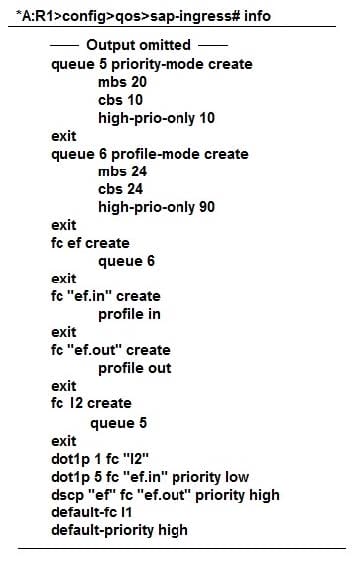Exam Details
Exam Code
:4A0-107Exam Name
:Nokia Quality of ServiceCertification
:Nokia CertificationsVendor
:NokiaTotal Questions
:212 Q&AsLast Updated
:Mar 27, 2025
Nokia Nokia Certifications 4A0-107 Questions & Answers
-
Question 31:
Which of the following QoS functions does the slope policy perform?
A. Classification
B. Marking
C. Buffer admission control
D. Scheduling
-
Question 32:
Which of the following is an example of something that CAN be done with hierarchical policing (CFHP) but CANNOT be done with standalone policers?
A. Limiting the maximum forwarding rate of each individual policer and, at the same time, marking, packets as in-profile or out-of-profile.
B. Putting packets in a buffer as they are received, and marking packets as in-profile or out-of-profile as they are removed from the buffer.
C. Rate-limiting the collective output of several policers, and to reallocate bandwidth that is not utilized by some policers to other policers that need to use it.
D. Rate-limiting the collective output of several policers towards each egress FFPC, while maintaining control of the maximum overall forwarding rate.
-
Question 33:
Which action should be taken to ensure that packets do not use the shared buffer space when put into a queue?
A. Set the queue's CBS to 0
B. Set the queue's MBS equal to the CBS
C. Set the queue's high-priority-only equal to the MBS
D. Set the queue's MBS to 0
E. Set the queue's high-priority-only to 0
-
Question 34:
By default, how does a hybrid port on a Nokia 7750 SR share its allocated buffer space between access and network pools?
A. All buffer space is initially allocated to access pools, and some of it is reallocated to network pools if network interfaces are configured on it.
B. All buffer space is initially allocated to network pools, and some of it is reallocated to access pools if service SAPs are configured on it.
C. Buffer space is allocated 50% for access pools and 50% for network pools.
D. Buffer space is allocated 25% for access pools and 75% for network pools.
-
Question 35:

According to the SAP-ingress QoS policy shown, what is the maximum amount of memory that queue 5 can use from the shared buffer pool?
A. 1 kilobyte
B. 2 kilobytes
C. 10 kilobytes
D. 20 kilobytes
-
Question 36:
Which of the following is an advantage of using queue-groups on a service SAP?
A. It enables CFHP.
B. It more scalable than using policers.
C. It allows a separate set of queues/policers for each VLAN on a port.
D. It allows a set of queues to be shared among multiple SAPs.
-
Question 37:
How many bits in the IP ToS field define the packet's precedence?
A. 3
B. 4
C. 6
D. 8
-
Question 38:
Which of the following criteria is NOT used in the behavior aggregate classification option?
A. dot1p
B. dst-mac
C. lsp-exp
D. dscp
-
Question 39:
A SAP-ingress policy is configured so that ping traffic is classified as FC L1 and mapped to queue 3; however, all traffic is placed in queue 1. What is the most probable reason for this?
A. The default forwarding class for ICMP traffic is BE and cannot be changed.
B. The SAP has been shut down.
C. Queue 3 has no PIR or CIR configured, and thus cannot hold any packets.
D. The SAP-ingress policy has not been applied to the SAP.
-
Question 40:
Which of the following statements about behavior aggregate classification is TRUE?
A. It sets both the forwarding class and the packet's dot1p, lsp-exp, precedence, or dscp field to the same value.
B. It groups all packets together into a single aggregate stream, and gives all packets the same treatment.
C. It copies the three most significant bits in the packet's dscp field into the forwarding class.
D. It assigns a forwarding class based on the packet's dot1p, lsp-exp, precedence, or dscp value.
Related Exams:
4A0-100
Nokia IP Networks and Services Fundamentals4A0-101
Nokia Interior Routing Protocols4A0-102
Nokia Border Gateway Protocol for Internet Routing4A0-103
Nokia Multiprotocol Label Switching4A0-104
Nokia Services Architecture4A0-105
Nokia Virtual Private LAN Services4A0-106
Nokia Virtual Private Routed Networks4A0-107
Nokia Quality of Service4A0-108
Nokia Multicast Protocols4A0-109
Alcatel-Lucent Triple Play Services
Tips on How to Prepare for the Exams
Nowadays, the certification exams become more and more important and required by more and more enterprises when applying for a job. But how to prepare for the exam effectively? How to prepare for the exam in a short time with less efforts? How to get a ideal result and how to find the most reliable resources? Here on Vcedump.com, you will find all the answers. Vcedump.com provide not only Nokia exam questions, answers and explanations but also complete assistance on your exam preparation and certification application. If you are confused on your 4A0-107 exam preparations and Nokia certification application, do not hesitate to visit our Vcedump.com to find your solutions here.